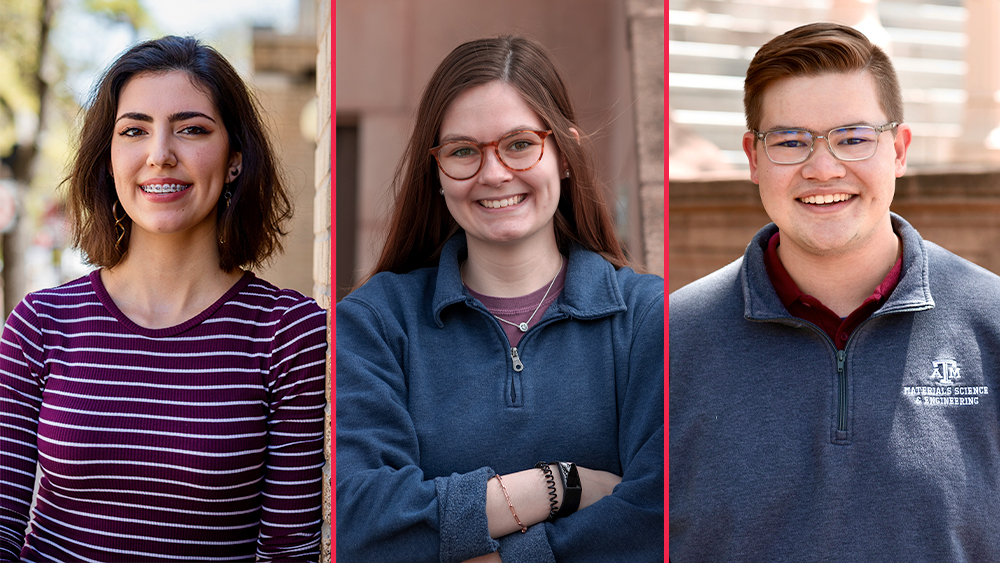
Three students from the Department of Materials Science and Engineering at Texas A&M University were recognized by the National Science Foundation’s (NSF) Graduate Research Fellowships Program (GRFP).
The prestigious and competitive GRFP supports outstanding graduate students who are pursuing a research-based master’s and/or doctoral degree in NSF-supported, STEM (science, technology, engineering and mathematics) fields of study. The fellowship provides financial support, including an annual stipend and cost of education allowance to the institution.
Suzanne Peterson and Jordan Brito were both awarded fellowships and Gregory Wong received an honorable mention.
“It is a great honor to be recognized by the NSF for this fellowship program; it reassures me in my decision to pursue my graduate studies in materials science and engineering,” said Peterson, who is studying experimental nanomechanics of polymer composites with Dr. Pavan Kolluru. “If there is one thing that I have learned throughout all of my research experiences, it is to never rest on your laurels and keep pushing and innovating. This fellowship is a great opportunity to keep pushing and innovating and is just the beginning of the exciting work that lies ahead of me.”
Peterson explained that her time at Texas A&M has shaped her research by exposing her to new topics and ways of thinking about problems. Looking forward, she would one day like to work as a faculty member and, completing the circle of giving, a program manager at a funding agency like NSF.
Brito, a second-year doctoral candidate, was introduced to materials science as a chemical engineering undergraduate through a course taught by her now advisor, Dr. Svetlana Sukhishvili. With a focus in functional polymer thin films, she hopes to continue pursuing her research and eventually become a faculty member at a research university.
“I’m very honored to be recognized for my achievements and potential to become a high-caliber researcher in my field,” she said. “I feel empowered to join a group of elite graduate students who have received this award.”
Finishing his time at Texas A&M this May, Wong has studied under two advisors while obtaining his undergraduate degree. He began by working with Dr. Ibrahim Karaman researching additive manufacturing of nickel titanium shape-memory alloys, then later taking part in an AggiE_Challenge project designing shape-memory alloy shims for Boeing. Then, he was advised by Dr. Jeffrey Bullard on two projects: the first involving computational research running kinetic Monte Carlo simulations and the second, an experimental project about the sintering behavior of lunar regolith simulants.
With his sights on pursuing his doctorate and then a career in either a national lab or at a university, he plans to continue conducting research wherever his path takes him.
“Academic research is so technical and specific that it can be hard to explain what I’m doing to people in my life who are outside of the academic sphere,” Wong said. “So, it’s really cool to be able to tell my parents of my recognition from the NSF because, while they might not know the specifics of what I’m doing, they recognize the prestige of the organization. It is a really nice way to finish out my time here at Texas A&M. It shows me how I have developed in the past four years.”